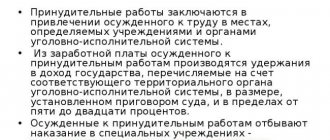The essence of forced labor
On the substantive side, forced labor involves engaging a convicted person to work in places determined by institutions and bodies of the penal system (Article 53.1 of the Criminal Code of the Russian Federation).
Just as during correctional labor, deductions are made from the wages of a person sentenced to forced labor to the state income, transferred to the account of the relevant territorial body of the penal system, in the amount established by the court verdict, and in the range from five to twenty percent.
Forced labor involves:
- forced labor;
- recruitment to work in special institutions - correctional centers;
- attraction to labor for a certain period (from two months to five years, with the exception of cases of replacement of punishment in the form of imprisonment with forced labor in accordance with Article 80 of the Criminal Code of the Russian Federation);
- withholding a certain share of the convict’s salary (ranging from five to twenty percent) into state income.
What are correctional and forced labor?
Hello! I read on the Internet that amendments have been made to Article 80 - after serving 1/2 of your sentence, you can do forced labor. The husband is serving his sentence. Please tell me what should I write and where? What is the difference between ITR and PTR? And what is required under the new amendments in the Samara region?
Lawyer Lebedev Z.S.
Good afternoon According to Article 80 of the Criminal Code, a person serving detention in a disciplinary military unit, forced labor or imprisonment, who has compensated for the damage (in whole or in part) caused by the crime, the court, taking into account his behavior during the entire period of serving the sentence, can replace the remaining unserved part punishment with a more lenient type of punishment, with the exception of cases of replacement of punishment in the form of imprisonment with forced labor in accordance with part two of this article. In this case, the person may be fully or partially released from serving an additional type of punishment. The unserved part of the sentence may be replaced by a more lenient type of punishment after the person sentenced to imprisonment has actually served: a crime of minor or medium gravity - at least one third of the sentence or at least one fourth of the sentence when replacing a sentence of imprisonment with forced labor; serious crime - not less than half the term of punishment or not less than one third of the term of punishment when replacing the punishment of imprisonment with forced labor; especially serious crime - at least two-thirds of the sentence or at least half of the sentence when replacing the sentence of imprisonment with forced labor; crimes against the sexual integrity of minors, as well as crimes provided for in Article 210 of this Code - at least three quarters of the sentence; crimes against the sexual integrity of minors under fourteen years of age - no less than four-fifths of the sentence. When replacing the unserved part of the sentence, the court may choose any milder type of punishment in accordance with the types of punishments specified in Article 44 of this Code, within the limits provided for by this Code for each type of punishment, with the exception of cases of replacing a sentence of imprisonment with forced labor in accordance with with part two of this article. When considering a petition from a convicted person or a submission from the administration of an institution or body executing a sentence to replace the unserved part of his sentence with a milder form of punishment, the court takes into account the behavior of the convicted person, his attitude to study and work during the entire period of serving the sentence, the attitude of the convicted person to the committed act, and that the convicted person partially or fully compensated for the damage caused or otherwise made amends for the harm caused as a result of the crime. In relation to a convicted person suffering from a disorder of sexual preference (pedophilia), which does not exclude sanity, and who, at the age of over eighteen years, has committed a crime against the sexual integrity of a minor under fourteen years of age, the court also takes into account the application of compulsory medical measures to the convicted person, his attitude towards treatment and results of forensic psychiatric examination. According to Article 15 of the Criminal Code, depending on the nature and degree of public danger, the acts provided for by this Code are divided into crimes of minor gravity, crimes of medium gravity, serious crimes and especially serious crimes. Crimes of minor gravity are recognized as intentional and careless acts, for the commission of which the maximum punishment provided for by this Code does not exceed three years of imprisonment. Crimes of average gravity are recognized as intentional acts, for the commission of which the maximum penalty provided for by this Code does not exceed five years of imprisonment, and careless acts, for the commission of which the maximum penalty provided for by this Code exceeds three years of imprisonment. Serious crimes are intentional acts for which the maximum punishment provided for by this Code does not exceed ten years of imprisonment. Particularly serious crimes are intentional acts, the commission of which is punishable by this Code in the form of imprisonment for a term of over ten years or a more severe punishment. Taking into account the actual circumstances of the crime and the degree of its public danger, the court has the right, in the presence of mitigating circumstances and in the absence of aggravating circumstances, to change the category of the crime to a less serious one, but not more than one category of crime, provided that for committing the crime specified in part three of this article, the convicted person is sentenced to a sentence not exceeding three years of imprisonment, or another more lenient punishment; for committing a crime specified in part four of this article, the convicted person is sentenced to a punishment not exceeding five years of imprisonment, or another more lenient punishment; for committing a crime specified in part five of this article, the convicted person is sentenced to a punishment not exceeding seven years of imprisonment. According to Article 50 of the Criminal Code, correctional labor is assigned to a convicted person who has a main place of work, as well as to those who do not have one. A convicted person who has a main place of work serves correctional labor at his main place of work. A convict who does not have a main place of work serves correctional labor in places determined by local government bodies in agreement with penal inspections, but in the area of the convict’s place of residence. Correctional labor is established for a period of two months to two years. From the salary of a person sentenced to correctional labor, deductions are made to the state income in the amount established by a court verdict, ranging from five to twenty percent. In case of malicious evasion of a convicted person from serving correctional labor, the court may replace the unserved sentence with forced labor or imprisonment at the rate of one day of forced labor or one day of imprisonment for three days of correctional labor. Correctional labor is not assigned to persons recognized as disabled people of the first group, pregnant women, women with children under three years of age, military personnel undergoing military service on conscription, as well as military personnel undergoing military service under a contract in military positions of privates and sergeants, if at the time of the court’s verdict, they had not served the statutory period of conscription service. According to Article 53.1 of the Criminal Code, forced labor is used as an alternative to imprisonment in cases provided for by the relevant articles of the Special Part of this Code, for committing a crime of minor or medium gravity or for committing a serious crime for the first time. If, having imposed a sentence of imprisonment, the court comes to the conclusion that it is possible for the convicted person to be corrected without actually serving the sentence in prison, it decides to replace the sentence of imprisonment with forced labor for the convicted person. When a court imposes a sentence of imprisonment for a term of more than five years, with the exception of cases where the punishment of imprisonment is replaced by forced labor in accordance with Article 80 of this Code, forced labor is not applied. Forced labor consists of engaging a convicted person to work in places determined by institutions and bodies of the penal system. Forced labor is imposed for a period of two months to five years, with the exception of cases of replacement of punishment in the form of imprisonment with forced labor in accordance with Article 80 of this Code. From the salary of a person sentenced to forced labor, deductions are made to the state's income, transferred to the account of the relevant territorial body of the penal system, in the amount established by a court verdict, and in the range from five to twenty percent. If a convicted person evades serving forced labor or a person sentenced to forced labor is recognized as a malicious violator of the order and conditions of serving forced labor, the unserved part of the sentence is replaced by imprisonment at the rate of one day of imprisonment for one day of forced labor. Forced labor is not assigned to minors, persons recognized as disabled people of the first or second group, pregnant women, women with children under three years of age, women who have reached the age of fifty-five, men who have reached the age of sixty, as well as military personnel. Thus, amendments have recently been made regarding the replacement of imprisonment with forced labor. Forced labor involves a person living in a special center and working in places determined by the penal inspection. Correctional labor is served at the convict’s place of work and represents a monthly deduction to the budget of part of the convict’s income.
Sincerely, lawyer Zakhar Lebedev, partner of the law firm Antonov and Partners.
Still have questions for your lawyer? Ask them right now here, or call us by phone in Moscow +7 (499) 288-34-32 or in Samara +7 (846) 212-99-71 (24 hours a day), or come to our office for a consultation (by pre-registration)!
Conditions for the use of forced labor as a type of criminal punishment
Forced labor is applied by the court in the following cases:
- when they are directly provided for by the sanction of the corresponding article of the Special Part of the Criminal Code of the Russian Federation as an alternative to imprisonment for committing a crime of minor or moderate gravity or a serious crime for the first time (“committing a crime for the first time” means that crimes for which convictions have been withdrawn or expunged in the manner prescribed by law are not subject to recording , or crimes for which the statute of limitations for criminal prosecution has expired);
- in case of malicious evasion from paying a fine imposed as the main type of punishment, from serving compulsory labor, correctional labor, or restriction of freedom;
- as a replacement for imprisonment imposed for a term of no more than five years, if the court comes to the conclusion that it is possible to correct the convicted person without actually serving the sentence in prison. When a court imposes a sentence of imprisonment for a term of more than five years, with the exception of cases where the punishment of imprisonment is replaced by forced labor in accordance with Article 80 of the Criminal Code of the Russian Federation, forced labor is not applied.
Timing and essence
Please note
The peculiarity of correctional labor is that the convicted citizen is not given options “to choose from”. The work is performed in the organization appointed by the inspector of the correctional institution. Also, the offender cannot resign on his own initiative. Read more in a separate article
Forced labor as a type of criminal punishment has been known to the Criminal Code of the Russian Federation since 2011, but its application was postponed until 2021 due to the lack of special institutions. Currently, 4 centers have been created in Russia, designed for 900 convicts.
The essence of the measure is to get the job done. Part of the earnings transferred to the person is withheld into the country's treasury. The amount of deductions is determined by a court verdict and varies from 5 to 20%.
The term of attraction is from 2 months to 5 years. It is important that if the court imposes a punishment in the form of imprisonment for a period of more than 5 years, then it cannot be replaced by forced labor.
Calculation of terms of forced labor
The period of forced labor is calculated from the day the convicted person arrives at the correctional center. The period of forced labor includes the time the convict is kept in custody as a preventive measure, the time spent traveling to the correctional center under escort, as well as the time of short-term trips provided to the convict in accordance with Art. 60.4 of the Penal Code of the Russian Federation at the rate of one day of detention, one day of travel to a correctional center under escort, one day of short-term departure for one day of forced labor.
The period of forced labor does not include the time of unauthorized absence of the convicted person from work or in a correctional center for more than one day.
Restrictions for attraction
If a citizen evades execution of a sentence, it is replaced by a more severe penalty - 1 day of imprisonment = 1 day of forced labor.
Restrictions on attraction (part 7 of article 53.1 of the Criminal Code of the Russian Federation):
- minor citizens,
- disabled people of groups I and II,
- pregnant women and raising children under 3 years of age,
- pensioners,
- military personnel.
Work order
Execution of punishment in the form of forced labor takes place in a correctional center. The period is counted from the day of arrival of the guilty person.
Among his responsibilities:
- compliance with internal regulations,
- work in areas established by the center administration,
- permanent stay within a correctional institution, etc.
Those sentenced to work live in special dormitories located within the boundaries of the correctional institution. They are prohibited from leaving at night and on non-working days (except in cases of obtaining permission from the administration).
Exemplary behavior and proper performance of the duties assigned to the convicted person allows him to live with his family (in the region where the correctional center is located). The condition is that more than 1/3 of the punishment period has expired.
Under what articles are mandatory labor imposed as a type of criminal punishment - read the article here https://lexconsult.online/7691-za-chto-naznachayut-obyazatelnye-raboty-po-uk-rf






